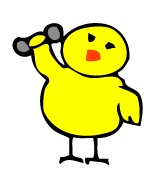 For as long as I can remember, there has been talk about low fat diets, low carb diets, high protein diets, liquid diets, a million other diets, and of course, counting calories. I have done the whole calorie counting thing many of times, with Excel spreadsheets and everything, and I always end up thinking it's the biggest pain in the ass ever, but it's definitely a great way to be honest with yourself with exactly how much you're eating. It's amazing how some things add up. Anyway, I did some Googling about this today and also have some info from my personal training books, so I'll go ahead and try to have an un-biased opinion...TRY.
For as long as I can remember, there has been talk about low fat diets, low carb diets, high protein diets, liquid diets, a million other diets, and of course, counting calories. I have done the whole calorie counting thing many of times, with Excel spreadsheets and everything, and I always end up thinking it's the biggest pain in the ass ever, but it's definitely a great way to be honest with yourself with exactly how much you're eating. It's amazing how some things add up. Anyway, I did some Googling about this today and also have some info from my personal training books, so I'll go ahead and try to have an un-biased opinion...TRY.First of all, I read a whole bunch of stuff on how a calorie IS a calorie, so if your body needs 1800 calories a day to stay at the same weight, you can use those calories how you want (1 meal at a fast food restaurant vs. 5 small healthy meals a day).... but seriously, who's going to stop at 1 meal (and no snacks that is...)? And don't you think you'd feel a little hungry, or tired, or something, and end up eating a whole lot more? Probably. So really, it's to your advantage to make those calories worth it, space them out throughout the day, and make mostly healthy decisions. The food choices you make will also help with not over-eating. Like if you have foods high in fiber, you're going to feel fuller for longer and that will stop you from making bad choices.
Second of all, calorie counting is super hard, especially when you're not eating at home all the time. SOME restaurants have nutritional information right on the table that you can look at, or posted on the wall somewhere very small, or even on the internet, but how many people actually do that every time they're going out to eat (of course I have before...haha). It's amazing the proportion size they give you at restaurants, which may make it VERY hard for you to estimate the amount of calories you're having. I've also heard that since Americans eat food out so much, they start thinking that what they get served at restaurants are normal, and start making food at home with much larger portions; which obviously leads to you have way more calories than you probably need. So, when people count calories, they generally tend to underestimate the actual amount of calories they are intaking. Of course it's even more inaccurate if you forget to add in that soda you had for lunch, or that chocolate bar you had for dessert. You really should get a food scale if you want to know you're getting the exact portion size...
Third of all, even though a calorie is a calorie like I said before, eating healthy and getting all your veggies, fruit, lean proteins, and whole grains will help beat off diseases like heart disease, cancer, and diabetes. Eating lots of fat, sugar, and things like that will add to your risk of these diseases and a whole bunch of other ones.
So pretty much what I'm trying to say here, is that calorie counting is probably a good initial thing to do for yourself in the beginning of trying to be healthier because it will really help you see what you're putting into your body and where you can make some positive changes. Just be aware that your ideas of portions may not be correct and weighing your food will really help with that. Also be aware that when you go out, you may be underestimating your calorie intake by A LOT. Even some nutritionists that took part in a study underestimated calories and fat in meals at restaurants by half!
After you have a good idea of how many calories are in different foods, and you know what a real portion is, it really works best (and is less time consuming) to just make healthy choices when you eat and to take smaller portions. When you're at a restaurant, ask for the sauce or salad dressing on the side, or get grilled chicken instead of fried, and be aware that your creamy dressing may add so many calories to your "healthy" salad, that you'd actually be better off getting the bacon cheeseburger. When you're at the grocery store, try to keep to the outer edges as much as possible because that's where the most healthy food is. Eat all your veggies, fruits, lean meats, and whole grains, and treat yourself to a "whatever I want" meal of the week. This way, you're mostly eating healthy, but you still get to have that cheat meal so you don't freak out and start eating everything in sight :).
Don't know how many calories you should have a day? WebMD has a bunch of calculators at this site that will really help you get on your way!



